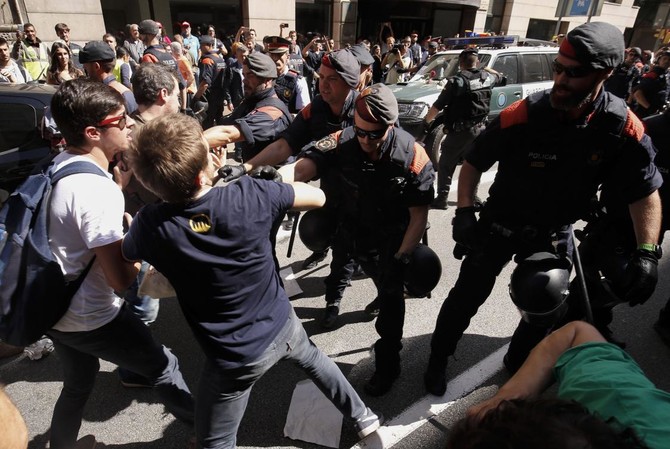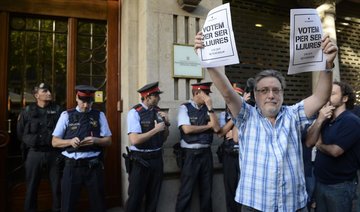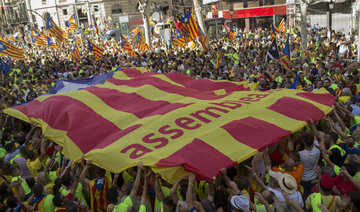MADRID: Thousands of people supporting a contested referendum to split Catalonia from Spain took to Barcelona’s streets amid an intensifying government crackdown on the independence vote that included the arrests of a dozen regional officials Wednesday and the seizure of 10 million ballot papers.
The arrests — the first involving Catalan officials since the campaign to hold an independence vote began in earnest in 2011 — prompted the regional government and some of its supporters to say casting a ballot was as much about dignity as whether to break away from Spain.
Regional Catalan officials so far have vowed to ignore a Constitutional Court order to suspend the Oct. 1 referendum while judges assess its legality.
Spanish Prime Minister Mariano Rajoy warned them of “greater harm” if they don’t drop the referendum bid, which he called a “totalitarian act.”
“Disobedience of the law by a part of the political power is the opposite of democracy, it means an imposition, an injustice, the violation of people’s rights and an attack to democracy,” Rajoy said in a televised appearance on Wednesday night.
“If you care about the tranquility of most Catalans, give up this escalation of radicalism and disobedience,” the conservative leader said, addressing Catalan officials directly. “You are on time to avoid a greater harm.”
Catalan nationalists argue that self-determination is an inalienable right that can’t be curbed by any constitution. The prime minister’s determination to prevent the ballot has backing from the main Spanish opposition parties.
Some members of Rajoy’s conservative government have even referred to the standoff as democratic Spain’s greatest political crisis since 1981, a failed coup attempt in the country’s parliament that came only three years after the official end of Gen. Francisco Franco’s dictatorship.
Spanish Interior Ministry officials would not identify the arrested regional officials, saying the investigation was ongoing. The Catalan regional government confirmed that among them were Josep Maria Jove, secretary general of economic affairs, and Lluis Salvado, secretary of taxation. Jove is the No. 2 to the region’s vice president and economy chief, Oriol Junqueras.
The Catalonia branch of Spain’s High Court said Wednesday that some 20 people were being investigated for alleged disobedience, abuse of power and embezzlement related to the referendum. Police acting on a judge’s orders searched 42 premises, including six regional government offices, officials’ private offices and homes, as well as three companies in Barcelona, the court said in a statement.
The arrests risked stoking public anger in Catalonia, where pro-independence passions can run high. Several thousand independence supporters gathered to angrily protest the raids outside government offices in Barcelona, which is Catalonia’s capital. Some demonstrators sat down in the street to block police cars, while a few scuffled with police officers.
Later, protesters rejoiced when National Police officers left the headquarters of the anti-establishment CUP political party. The officers waited hours for a judge to sign off on a warrant to search the premises for referendum-related propaganda, but the permission never came.
Protests also occurred in other Catalan towns and in Spain’s capital, Madrid. There were no reports of arrests and one person was reported injured, according to the regional police.
At the demonstration outside the Catalan regional ministry of economy, protester Charo Rovira said she felt sad at the turn of events.
“Catalonia is practically in a state of siege,” she said. She added that the arrested politicians were merely acting according to the will of the people.
Catalonia’s president, Carles Puigdemont, blasted the police operations as “unlawful” and accused the national government of adopting a “totalitarian attitude.” He accused Madrid of bringing a state of emergency to Catalonia and of effectively canceling the northeastern region’s self-rule.
His televised statement came as Spain’s Finance Ministry said it was imposing further controls over the Catalan government’s finances to ensure no public money is used for the referendum.
Finance Minister Cristobal Montoro’s order means that virtually all of Catalonia’s public spending will be handled in Madrid and that no credits could be requested for non-essential payments.
Catalonia represents a fifth of Spain’s 1.1-trillion-euro ($1.32 trillion) economy and enjoys wide self-government authority, although key areas such as infrastructure and taxes are in the hands of central authorities. The region’s 7.5 million inhabitants overwhelmingly favor holding a referendum, but are roughly evenly divided over independence.
As part of the crackdown, police confiscated nearly 10 million ballot papers, the Interior Ministry said. Polling station signs and documents for election officers were also seized during a raid on a warehouse in a small town outside Barcelona.
“Today the government of Rajoy has crossed a very dangerous red line,” Jordi Sanchez, president of Catalan National Assembly, a civic group leading the independence drive said. “We will do all we can for democracy and freedom to prevail.”
Barcelona Football Club, which is popular around the world, waded into the controversy, too. The soccer team said it “condemns any act that may impede the free exercise of (democratic) rights” and vowed to “continue to support the will of the majority of Catalan people, and will do so in a civil, peaceful, and exemplary way.”
Spain’s Interior Ministry canceled time off and scheduled leave for Civil Guard and National Police officers who are being deployed to ensure the vote doesn’t happen. It gave no details on the number of agents involved.
___
AP photographer Emilio Morenatti and videographer Hernan Munoz contributed from Barcelona. Barry Hatton contributed from Lisbon, Portugal.
Clash over Catalan vote heats up in Spain as police swoop in
Clash over Catalan vote heats up in Spain as police swoop in

Trump says he would love to make a deal with Iran

US President Donald Trump said on Tuesday that he would love to make a deal with Iran to improve bilateral relations, but added that Tehran should not develop a nuclear weapon.
“I say this to Iran, who's listening very intently, 'I would love to be able to make a great deal. A deal where you can get on with your lives,”” Trump told reporters in Washington.
“They cannot have one thing. They cannot have a nuclear weapon and if I think that they will have a nuclear weapon ... I think that's going to be very unfortunate for them,” He said.
Drone attack sparks blaze at oil depot in Russia’s Krasnodar, governor says

A Ukrainian drone attack overnight sparked a fire at an oil depot in Russia’s southern region of Krasnodar that has since been extinguished, regional officials said on Wednesday.
A series of drone attacks by Ukraine on Russia’s energy facilities have sparked fires in recent days at a major oil refinery in the Volgograd region, as well as at the Astrakhan gas processing plant.
“The fire in a tank with oil product residues in the village of Novominskaya in the Kanevsky District was fully extinguished,” the region’s operational authorities said on the Telegram messaging app.
Earlier, Veniamin Kondratyev, governor of the Krasnodar region, said that there were no injuries in the fire that was caused by a falling drone debris. A team of 19 people wielding 19 items of equipment were fighting the flames, he said.
Kondratyev did not say which depot was on fire or detail the extent of damage.
The Russian defense ministry said that four Ukrainian drones were destroyed over the Russian territory overnight, but did not mention the Krasnodar region in a statement on the Telegram messaging app.
The ministry only reports drones that its air defense systems destroy, not how many were launched.
There was no immediate comment from Ukraine. Kyiv says that its attacks inside Russia are aimed at destroying infrastructure key to Moscow’s war in Ukraine and are in response to Russian continued bombing of Ukraine.
5 people wounded in shooting at Ohio cosmetics warehouse

- Police say five people have been wounded in a shooting at a cosmetics warehouse in New Albany, Ohio
- A spokesperson for New Albany says victims of Tuesday night’s shooting have been transported to the hospital
NEW ALBANY: Five people were wounded in a shooting Tuesday night at a cosmetics warehouse in Ohio, officials said.
The victims have been transported to the hospital and the suspect is no longer believed to be at the building, said Josh Poland, a spokesperson for the city of New Albany.
The shooting happened at the warehouse for a company that makes products including cosmetics and toiletries. Police did not immediately provide details of the circumstances surrounding the shooting or the conditions of those wounded.
Police were working to evacuate all the employees following the shooting, which happened just before 11 p.m., police said in a statement.
India PM Modi’s party seeks to oust anti-corruption crusader in New Delhi state elections

- Thousands are voting in the Indian capital’s state legislature election, with Prime Minister Narendra Modi’s Hindu nationalist party trying to unseat a powerful regional group that has ruled New Delhi
- Kejriwal’s party won 62 out of 70 seats in the last election in 2020
NEW DELHI: Thousands begin voting in the Indian capital’s state legislature election on Wednesday, with Prime Minister Narendra Modi’s Hindu nationalist party trying to unseat a powerful regional group that has ruled New Delhi for over a decade.
Voters walked to polling booths on a cold, wintry morning to cast their ballots across the sprawling capital. Manish Sisodia, a key Aam Aadmi Party leader, and others offered prayers in a temple before voting.
Modi’s Bharatiya Janata Party is up against the AAP, led by Arvind Kejriwal, which runs New Delhi and has built a vast support base on its welfare policies and an anti-corruption movement. Kejriwal, a popular crusader against corruption, suffered a setback as he himself faced graft allegations.
The AAP won 62 out of 70 seats in a landslide victory in the last election, held in 2020. leaving BJP with only eight and the Congress party with none. The AAP had also swept the 2015 state elections, winning 67 seats, with the BJP taking three.
Modi and Kejriwal have both campaigned vigorously in roadshows with thousands of supporters tailing them. They have offered to revamp government schools and provide free health services and electricity, and a monthly stipend of over 2,000 rupees ($25) to poor women.
Voting ends later Wednesday, with results due on Saturday. More than 15 million people are eligible to vote in New Delhi’s election.
Arati Jerath, a political commentator, predicted a tight contest between the two parties, saying, “Even since the AAP rose to prominence, it has been a one-sided contest.”
Delhi, a city of more than 20 million people, is a federal territory that Modi’s party has not won for over 27 years despite having a sizable support base there.
Kejriwal and other AAP leaders recently faced graft allegations in a liquor license case.
Neerja Chowdhury, a political analyst, said the liquor policy case — in which several AAP leaders, including Kejriwal, went to jail — had dented Kejriwal’s clean image.
Kejriwal was arrested last year along with two key leaders of his party ahead of national elections on charges of receiving bribes from a liquor distributor. They have consistently denied the accusations, saying they are part of a political conspiracy. The Supreme Court allowed the release of Kejriwal and other ministers on bail.
Kejriwal later relinquished the chief minister’s post to his most senior party leader.
The BJP, which failed to secure a majority on its own in last year’s national election but formed the government with coalition partners, has gained some lost ground by winning two state elections in northern Haryana and western Maharashtra states.
Modi’s party hopes to benefit after last week’s federal budget slashed income taxes on the salaried middle class, one of its key voting blocks.
Opposition parties widely condemned Kejriwal’s arrest, accusing Modi’s government of misusing federal investigation agencies to harass and weaken political opponents, and pointed to several raids, arrests and corruption investigations of key opposition figures in the months before the national election.
Kejriwal vowed to be an anti-corruption crusader and formed the AAP in 2012 after tapping into public anger against the then-Congress party government over a series of corruption scandals. His pro-poor policies have focused on fixing state-run schools and providing cheap electricity, free health care and bus transport for women.
The BJP was voted out of power in Delhi in 1998 by the Congress party, which ran the government for 15 years. In the 2015 and 2020 elections in Delhi, the AAP won landslide victories.
Vietnamese man sentenced to 44 years for plotting suicide attack at London’s Heathrow

- He spent a year in Yemen, where he received “military-type” training and helped prepare the group’s magazine, Inspire, working directly with Samir Khan, a US citizen who served as its editor and died in a US drone strike in 2011, according to the departme
LONDON: A Vietnamese man was sentenced to 44 years in prison for attempting to carry out a suicide attack at Heathrow International Airport in London, the US Department of Justice said on Tuesday.
Minh Quang Pham, 41, who was alleged to have traveled to Yemen to receive military training from Al-Qaeda in the Arabian Peninsula, had previously pleaded guilty charges that included providing material support to the group.
US Attorney for the Southern District of New York Danielle R. Sassoon described his actions not only as an affront to the safety of the US “but to the principles of peace and security that we hold dear.”
“Today’s sentencing underscores our collective resolve to stop terrorism before it occurs, and place would-be terrorists in prison,” Sassoon said in a statement.
The Justice Department said Pham traveled from the United Kingdom to Yemen in December 2010 and took an oath of allegiance to the militant group, which the United States lists as a terrorist organization.
He spent a year in Yemen, where he received “military-type” training and helped prepare the group’s magazine, Inspire, working directly with Samir Khan, a US citizen who served as its editor and died in a US drone strike in 2011, according to the department.
Pham was arrested by British authorities in 2011 and extradited to the United States four years later to face terrorism charges, it added.


















